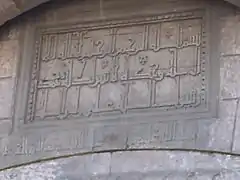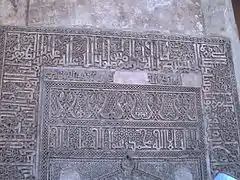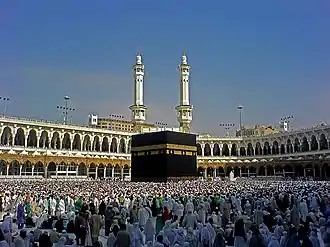Adhan
The adhan (Arabic: أَذَان [ʔaˈðaːn]), also written as adhaan, azan, azaan, or athan, also called ezan in Persian, Urdu, and Turkish, among other languages,[1] is the Islamic call to prayer, recited by a muezzin at prescribed times of the day. The root of the word is ʾadhina أَذِنَ meaning "to listen, to hear, be informed about". Another derivative of this word is ʾudhun (أُذُن), meaning "ear".
| Part of a series on |
| Islam |
|---|
 |
|
Adhan is called out by a muezzin from the mosque five times a day, a whole day long in the event of religious holidays (i.e. Eid al-Fitr or Eid al-Adha), traditionally from the minaret, summoning Muslims for obligatory (fard) prayer (salah). A second call, known as the iqamah then summons Muslims to line up for the beginning of the prayers. The main purpose behind the multiple loud pronouncements of adhan in every mosque is to make available to everyone an easily intelligible summary of Islamic belief. In modern times, loudspeakers have been installed on minarets for this purpose.
| Adhan | |
| Arabic | أَذَان |
|---|---|
| Romanization | aḏān, azan, athan, azaan, adhaan, athaan |
| Literal meaning | call to prayer |
Muezzin

The muezzin (Arabic: مُؤَذِّن muʾaḏḏin) is the person who recites the Adhan[2]:470 from the mosque. Typically in modern times, this is done using a microphone: a recitation that is consequently broadcast to the speakers usually mounted on the higher part of the mosque's minarets, thus calling those nearby to prayer. However, in many mosques, the message can also be recorded. This is due to the fact that the "call to prayer" has to be done loudly and at least five times a day. This is usually done by replaying previously recorded "call to prayer" without the presence of a muezzin. This way, the mosque operator has the ability to edit or mix the message and adjust the volume of the message while also not having to hire a full-time muezzin or in case of the absence of a muezzin. This is why in many Muslim countries, the sound of the prayer call can be exactly identical between one mosque and another, as well as between one Salah hour and another, as is the case for the London Central Mosque. In the event of a religious holidays like Eid al-Fitr, for example in Indonesia, where the Kalimah (speech) has to be recited out loud all day long, mosque operators uses this recording method to create a looping recital of the Kalimah.
The muezzin is chosen for his ability in reciting the Adhan clearly, melodic and loudly for all Muslims to hear. This is one of the important duties in the mosque, as his companions and community rely on him in his call for Muslims to come to pray in congregation. The Imam leads the prayer five times a day. The first muezzin in Islam was Bilal ibn Rabah, a freed slave of Abyssinian heritage.[3]
Text
| Recital By Sunni[lower-alpha 1] [4][5][6][7] By Shia [6][7][8] By |
Arabic Qurʾanic Arabic |
Transliteration | Translation |
|---|---|---|---|
| 4x or 2x[lower-alpha 2] 4x 8x or 4x |
ٱللَّٰهُ أَكْبَرُ | ʾAllāhu ʾakbaru | Allah is greatest |
| 2x 2x 2x |
أَشْهَدُ أَنْ لَا إِلَٰهَ إِلَّا ٱللَّٰهُ | ʾašhadu ʾan lā ʾilāha ʾillā -llāhu | I bear witness that there is no deity but Allah |
| 2x 2x 2x |
أَشْهَدُ أَنَّ مُحَمَّدًا رَسُولُ ٱللَّٰهِ | ʾašhadu ʾanna Muḥammadan rasūlu -llāhi | I bear witness that Muhammad is the Messenger of Allah |
| 2x 2x 2x |
حَيَّ عَلَىٰ ٱلصَّلَاةِ حَيَّ عَلَىٰ ٱلصَّلَوٰةِ |
ḥayya ʿalā ṣ-ṣalāhti | Hasten to the prayer (Salah) |
| 2x 2x 2x |
حَيَّ عَلَىٰ ٱلْفَلَاحِ حَيَّ عَلَىٰ ٱلْفَلَٰحِ |
ḥayya ʿalā l-falāḥi | Hasten to the salvation |
| 2x (Fajr prayer only)[lower-alpha 3] None None |
ٱلصَّلَاةُ خَيْرٌ مِنَ ٱلنَّوْمِ ٱلصَّلَوٰةُ خَيْرٌ مِنَ ٱلنَّوْمِ |
aṣ-ṣalātu khayrun mina n-nawmi | Prayer is better than sleep |
| 2x 2x 2x |
ٱللَّٰهُ أَكْبَرُ | ʾAllāhu ʾakbaru | Allah is greatest |
| 1x 2x 1x |
لَا إِلَٰهَ إِلَّا ٱللَّٰهُ | lā ʾilāha ʾillā -llāhu | There is no deity but Allah |
Views
Sunni view
Sunnis state that the adhan was not written or said by the Islamic prophet, Muhammad, but by one of his Sahabah (his companions). Abdullah ibn Zayd, a sahabi of Muhammad, had a vision in his dream, in which the call for prayers was revealed to him by God. He later related this to his companions. Meanwhile, this news reached Muhammad, who confirmed it. Because of his stunning voice Muhammad chose a freed Habeshan slave by the name of Bilal ibn Rabah al-Habashi to make the call for prayers. Muhammad preferred the call better than the use of bells (as used by the Christians) and horns (as by the Jews).[6][7][10]
During the Friday prayer (Salat al-Jumu'ah), there is one adhan but some Sunni Muslims increase it to two adhans; the first is to call the people to the mosque, the second is said before the Imam begins the khutbah (sermon). Just before the prayers start, someone amongst the praying people recites the iqama as in all prayers. The basis for this is that at the time of the Caliph Uthman he ordered two adhans to be made, the first of which was to be made in the marketplace to inform the people that the Friday prayer was soon to begin, and the second adhan would be the regular one held in the mosque. Not all Sunnis prefer two adhans as the need for warning the people of the impending time for prayer is no longer essential now that the times for prayers are well known.
Shia view
| External video | |
|---|---|
Shia sources state Muhammad, according to God's command, ordered the adhan as a means of calling Muslims to prayer. Shia Islam teaches that no one else contributed, or had any authority to contribute, towards the composition of the adhan.[6][7][8]
Shia sources also narrate that Bilal ibn Rabah al-Habashi was, in fact, the first person to recite the Adhan publicly out loud in front of the Muslim congregation.
The fundamental phrase lā ʾilāha ʾillā llāh is the foundation stone of Islam along with the belief in it. It declares that "there is no god but the God". This is the confession of Tawhid or the "doctrine of Oneness [of God]".
The phrase Muḥammadun rasūlu -llāh fulfills the requirement that there should be someone to guide in the name of God, which states Muhammad is God's Messenger. This is the acceptance of prophethood or Nabuwat of Muhammad.


Muhammad declared Ali ibn Abi Talib as his successor, at Ghadir Khumm, which was required for the continuation of his guidance. According to the hadith of the pond of Khumm, Muhammad stated that "Of whomsoever I am the authority, Ali is his authority". Hence, it is recommended to recite the phrase ʿalīyun walī -llāh ("Ali is His [God's] Authority").
In one of the Qiblah of Ma'ad al-Mustansir Billah (1035–1094) of Fatemi era masjid of Qahira (Mosque of Ibn Tulun) engraved his name and kalimat ash-shahādah as lā ʾilāha ʾillā -llāh, muḥammadun rasūlu -llāh, ʿalīyun walīyu -llāh (لَا إِلَٰهَ إِلَّا ٱللَّٰهُ مُحَمَّدٌ رَسُولُ ٱللَّٰهِ عَلِيٌّ وَلِيُّ ٱللَّٰهِ).
Adhan reminds Muslims of these three Islamic teaching Tawhid, Nabuwat and Imamate before each prayer. These three emphasise devotion to God, Muhammad and Imam, which are considered to be so linked together that they can not be viewed separately; one leads to other and finally to God.
The phrase is optional to some Shia as justified above. They feel that Ali's Walayah ("Divine Authority") is self-evident, a testification and need not be declared. However, the greatness of God is also taken to be self-evident, but Muslims still declare Allāhu ʾakbar to publicize their faith. This is the reason that the most Shia give for the recitation of the phrase regarding Ali.
The eleventh century Ismaili thinker, Nasir Khusraw, presents his view of the symbolism of the adhan in his Face of the Religion (Wajh-i Dīn). In it, he writes in his esoteric interpretation () of the adhan that when the muezzin turns to the right saying, ‘come to prayer’ (ḥayya is sybolic of saying that one should accept the conveyor of divine revelation (nāṭiq) and the Imam, thes of the exoteric (ẓāhir), by performing the exo prayer. When the muezzin turns to the left saying, ‘come to salvation’ (ḥayya ʿalā’l-falāḥ), it means thathe knwledge of reality (ḥaqīqat), one should accept the foundation of spiriterpretation (asās) and proof (ḥujjat) as the lords of the esoteric (bāṭin). Nasir Khusraw also adds that the adhan itself is symbolic of the conveyor calling humankind to the Lord of the Resurrection (Qāʾim al-Qiyāma).[11]
Dua (supplication)
Sunni
While listening to the Adhan, Sunni Muslims repeat the same words silently, except when the Adhan reciter (muezzin) says: "حَيَّ عَلَىٰ ٱلصَّلَاةِ" or "حَيَّ عَلَىٰ ٱلْفَلَاحِ" (ḥayya ʿalā ṣ-ṣalāhti or ḥayya ʿala l-falāḥi)[12] they silently say: "لَا حَوْلَ وَلَا قُوَّةَ إِلَّا بِٱللَّٰهِ" (lā ḥawla wa lā quwwata ʾillā bi-llāhi) (there is no strength or power except from God).[13]
Immediately following the Adhan, Sunni Muslims recite the following dua (supplications):
1. A testimony:
وَأَنَا أَشْهَدُ أَنْ لَا إِلَٰهَ إِلَّا ٱللَّٰهُ وَحْدَهُ لَا شَرِيكَ لَهُ وَأَنَّ مُحَمَّدًا عَبْدُهُ وَرَسُولُهُ رَضِيتُ بِٱللَّٰهِ رَبًّا وَمُحَمَّدٍ رَسُولًا وَبِٱلْإِسْلَامِ دِينًا
wa-ʾanā ʾašhadu ʾan lā ʾilāha ʾillā llāhu waḥdahu lā šarīka lahu wa-ʾanna muḥammadan ʿabduhu wa-rasūluhu, raḍītu bi-llāhi rabban wa-bi-muḥammadin rasūlan wa-bi-lʾislāmi dīnān
“I bear witness that there is no god but God alone with no partner and that Muhammad is His servant and Messenger, and the Lord God's chosen messenger is Muhammad and Islam is his religion.”[14]
2. An invocation of blessings on Muhammad:
ٱللَّٰهُمَّ صَلِّ عَلَىٰ مُحَمَّدٍ وَعَلَىٰ آلِ مُحَمَّدٍ كَمَا صَلَّيْتَ عَلَىٰ إِبْرَاهِيمَ وَعَلَىٰ آلِ إِبْرَاهِيمَ إِنَّكَ حَمِيدٌ مَجِيدٌ ٱللَّٰهُمَّ بَارِكْ عَلَىٰ مُحَمَّدٍ وَعَلَىٰ آلِ مُحَمَّدٍ كَمَا بَارَكْتَ عَلَىٰ إِبْرَاهِيمَ وَعَلَىٰ آلِ إِبْرَاهِيمَ إِنَّكَ حَمِيدٌ مَجِيدٌ
ʾallāhumma ṣalli ʿalā muḥammadin wa-ʿalā ʾāli muḥammadin, kamā ṣallayta ʿalā ʾibrāhīma wa-ʿalā ʾāli ʾibrāhīma, ʾinnaka ḥamīdun majīd. ʾallāhumma bārik ʿalā muḥammadin wa-ʿalā ʿalā muḥammadin, kamā bārakta ʿalā ʾibrāhīma wa-ʿalā ʾāli ʾibrāhīma ʾinnaka ḥamīdun majīdun
“O Allah, sanctify Muhammad and the Progeny of Muhammad, as you have sanctified Ibrahim and the Progeny of Ibrahim. Truly, You are Praised and Glorious. O Allah, bless Muhammad and the Progeny of Muhammad, as you have blessed Ibrahim and the Progeny of Ibrahim. Truly, You are Praised and Glorious.”[15]
3. Muhammad's name is invoked requested:
ٱللَّٰهُمَّ رَبَّ هَٰذِهِ ٱلدَّعْوَةِ ٱلتَّامَّةِ وَٱلصَّلاَةِ ٱلْقَائِمَةِ آتِ مُحَمَّدًا ٱلْوَسِيلَةَ وَٱلْفَضِيلَةَ وَٱبْعَثْهُ مَقَامًا مَحْمُودًا ٱلَّذِي وَعَدْتَهُ
ʾallāhumma rabba haḍihi d-daʿawati t-tāmmah wa-ṣ-ṣalāti l-qaʾimati, ʾāti muḥammadan al-wasīlata wa-l-faḍīlata wa-bʿathhu l-maqaman al-maḥmūdan al-laḍī waʿadtahū
“O, Allah! Lord of this perfect call and of the established prayer, give Muhammad the right of intercession and illustriousness, and resurrect him to the best and the praised position that You have covenanted him.”[14]
4. Dua are then made directly to God, between the adhan and the iqamaah.
According to Abu Dawud, Muhammad said: "Repeat the words of the mu'azzin and when you finish, ask God what you want and you will get it".[16]
Shia
While listening to the Adhan, Shia Muslims repeat the same words silently, except when the Adhan reciter (muezzin) says: "أَشْهَدُ أَنْ لَا إِلَٰهَ إِلَّا ٱللَّٰهُ" and "أَشْهَدُ أَنَّ مُحَمَّدًا رَسُولُ ٱللَّٰهِ" (ʾašhadu ʾan lā ʾilāha ʾillā -llāhu and ʾašhadu ʾanna Muḥammadan rasūlu -llāhi) they silently say:
وَأَنَا أَشْهَدُ أَنْ لَا إِلَٰهَ إِلَّا ٱللَّٰهُ وَأَشْهَدُ أَنَّ مُحَمَّدًا رَسُولُ ٱللَّٰهِ (صَلَّىٰ ٱللَّٰهُ عَلَيْهِ وَآلِهِ وَسَلَّمَ) أَكْتَفِي بِهَا عَمَّنْ أَبَىٰ وَجَحَدَ وَأُعِينُ بِهَا مَنْ أَقَرَّ وَشَهِدَ
wa-ʾanā ʾašhadu ʾan lā ʾilāha ʾillā -llāhu wa-ʾašhadu ʾanna muḥammadan rasūlu -llāhi (ṣallā -llāhu ʿalayhi wa-ʾālihi wa-sallama) ʾaktafī bihā ʿamman ʾabā wa-jaḥada wa-ʾuʿīnu bihā man ʾaqarra wa-šahida
“And I [also] bear witness that there is no deity but God, I bear witness that Muhammad is the Messenger of God, and I suffice by it (the testimonies) against whoever refuses and fights against it (the testimonies), and I designate by it one who agrees and testifies.”[17]
Whenever Muhammad's name is mentioned in the Adhan or Iqama, Shia Muslims recite salawat,[18] a form of the peace be upon him blessing specifically for Muhammad. This salawat is usually recited as either ṣallā -llāhu ʿalayhī wa-ʾālihī wa-sallama (صَلَّىٰ ٱللَّٰهُ عَلَيْهِ وَآلِهِ وَسَلَّمَ), ṣallā -llāhu ʿalayhī wa-ʾālihī (صَلَّىٰ ٱللَّٰهُ عَلَيْهِ وَآلِهِ), or ʾallāhumma ṣalli ʿalā muḥammadin wa-ʾāli muḥammadin (ٱللَّٰهُمَّ صَلِّ عَلَىٰ مُحَمَّدٍ وَآلِ مُحَمَّدٍ).
Immediately following the Adhan, Shia Muslims sit and recite the following dua (supplication):
ٱللَّٰهُمَّ ٱجْعَلْ قَلْبِي بَارًّا وَرِزْقِي دَارًّا وَٱجْعَلْ لِي عِنْدَ قَبْرِ نَبِيِّكَ (صَلَّىٰ ٱللَّٰهُ عَلَيْهِ وَآلِهِ وَسَلَّمَ) قَرَارًا وَمُسْتَقَرًّا
ʾallāhumma -jʿal qalbī bārran wa-rizqī dārran wa-jʿal lī ʿinda qabri nabīyika (ṣallā -llāhu ʿalayhi waʾ-ālihi wa-sallama) qarāran wa-mustaqarrān
“O Allah! Make my heart to be righteous, and my livelihood to be constant, and my sustenance to be continuous, and Make for me, in the presence of Your Prophet (God bless him and his progeny and grant him peace) a dwelling and a rest.”[17]
Form
Each phrase is followed by a longer pause and is repeated one or more times according to fixed rules. During the first statement each phrase is limited in tonal range, less melismatic, and shorter. Upon repetition the phrase is longer, ornamented with melismas, and may possess a tonal range of over an octave. The adhan's form is characterised by contrast and contains twelve melodic passages which move from one to another tonal center of one maqam a fourth or fifth apart. Various geographic regions in the Middle East traditionally perform the Adhan in particular maqamat: Medina, Saudi Arabia uses Maqam Bayati while Mecca uses Maqam Hijaz. The tempo is mostly slow; it may be faster and with fewer melismas for the sunset prayer. During festivals, it may be performed antiphonally as a duet.[19]
Modern legal standing
Bangladesh
In 2016, opposition leader Khaleda Zia alleged the government was preventing the broadcasting of adhans through loudspeakers, with government officials citing security concerns for the prime minister Sheikh Hasina".[20]
Israel
In 2016, Israel's ministerial committee approved a draft bill that limits the volume of the use of public address systems for calls to prayer, particularly, outdoor loudspeakers for adhaan, citing it as a factor of noise pollution.[21][22][23] The bill was submitted by Knesset member Motti Yogev of the far right Zionist party Jewish Home and Robert Ilatov of the right wing Yisrael Beiteinu.[22] The ban is meant to affect three mosques in Abu Dis village of East Jerusalem, disbarring them from broadcasting the morning call (fajr) prayers.[24] The bill was backed by Prime Minister Benjamin Netanyahu who said: "I cannot count the times — they are simply too numerous — that citizens have turned to me from all parts of Israeli society, from all religions, with complaints about the noise and suffering caused to them by the excessive noise coming to them from the public address systems of houses of prayer."[23] The Israel Democracy Institute, a non-partisan think tank, expressed concerns that it specifically stifles the rights of Muslims, and restricts their freedom of religion.[23][24]
Turkey
As an extension of the reforms brought about by the establishment of the Republic of Turkey in 1923, the Turkish government at the time, encouraged by Atatürk, introduced secularism to Turkey. The program involved implementing a Turkish adhan program as part of its goals, as opposed to the conventional Arabic call to prayer.[25] Following the conclusion of said debates, on the 1 February 1932, the Adhan was chanted in Turkish and the practice was continued for a period of 18 years. There was some resistance against the Adhan in Turkish language and protests surged. In order to suppress this protests, in 1941, a new law was issued, with which people who chanted the Adhan in Arabic could be imprisoned until for up to 3 months and be fined with up to 300 Turkish Lira.
On 17 June 1950, a new government led by Adnan Menderes, restored Arabic as the liturgical language.[26]
Sweden
The Fittja Mosque in Botkyrka, south of Stockholm, was in 2013 the first mosque to be granted permission for a weekly public call to Friday prayer, on condition that the sound volume does not exceed 60 dB.[27] In Karlskrona (province of Blekinge, southern Sweden) the Islamic association built a minaret in 2017 and has had weekly prayer calls since then.[28][29] The temporary mosque in Växjö filed for a similar permission in February 2018,[30] which sparked a nationwide debate about the practice.[31][32][33] A yearlong permission was granted by the Swedish Police Authority in May the same year.[34][35]
Kuwait and UAE
During the outbreak of the coronavirus in 2019-2020 and the resultant viral pandemic, some cities in Kuwait changed its adhan from the usual hayya 'ala as-salah, meaning "come to prayer", to as-salatu fi buyutikum meaning "pray in your homes" or ala sallu fi rihalikum meaning "pray where you are".[36]
Other Muslim countries (notably Saudi Arabia, Malaysia and Indonesia) also make this change because Muslims are prohibited to pray in mosques during the pandemic as preventive measures to stop the chain of the outbreak. The basis for the authority to change a phrase in the adhan was justified by the Prophet Muhammad's instructions while calling for adhan during adverse conditions.[37]
In popular culture
Turkish National Anthem
The adhan is mentioned in the eighth verse of İstiklâl Marşı, the Turkish national anthem:
O glorious God, the sole wish of my soul is that,
No heathen's hand should ever touch the bosom of my sacred Temples.
These adhans, whose shahadahs are the foundations of my Dīn (religion),
May their noble sound last loud and wide over my eternal homeland.
"The Armed Man"
The adhan appears in "The Armed Man: A Mass For Peace" composed by Karl Jenkins.
See also
- Barechu - Jewish call to prayer
- Church bells - Christian call to prayer
- Dhikr
- Tashahhud
References
- Nathal M. Dessing Rituals of Birth, Circumcision, Marriage, and Death Among Muslims in the Netherlands Peeters Publishers 2001 ISBN 978-9-042-91059-1 page 25
- Mohammad Taqi al-Modarresi (26 March 2016). The Laws of Islam (PDF). Enlight Press. ISBN 978-0994240989. Retrieved 22 December 2017.
- William Muir, The Life of Mohammad from Original Sources, reprinted by Adamant Media ISBN 1-4021-8272-4
- Sahih Bukhari 89.329 Archived 2008-12-04 at the Wayback Machine
- Sahih Muslim : Book 020: Number 4477, 4478, 4480, 4481, 4482, 4483 Archived 2011-08-20 at the Wayback Machine
- "Sahih Muslim". sunnah.com. Retrieved 2020-03-18.
- Sunan al-Tirmidhi (Arabic) Chapter of Fitan, 2:45 (India) and 4:501 Tradition # 2225 (Egypt); Hadith #2149 (numbering of al-'Alamiyyah)
- Quran : Surah Sajda: Ayah 24-25
- Kitab rab as-sad by Sana'ani
- Haykal, Muhammad Husayn (May 1994). The Life of Muhammad. p. 200. ISBN 9789839154177.
- Virani, Shafique. "The Days of Creation in the Thought of Nasir Khusraw". Nasir Khusraw: Yesterday, Today, Tomorrow.
- Muwatta
- Sahih Al-Bukhari #548
- https://www.muslimgoogle.com/2020/10/dua-after-adhan.html
- Sahih Al-Bukhari 3370
- Abu Dawud 524
- Al-Kulayni, Ya'qub (940). الكافي [Al-Kafi] (PDF) (in Arabic and English). Hub-e-Ali.
- Al-Kulayni, Ya'qub (940). الكافي [Al-Kafi] (PDF) (in Arabic and English). Hub-e-Ali.
- Touma, Habib Hassan (1996). The Music of the Arabs, p.157-158, trans. Laurie Schwartz. Portland, Oregon: Amadeus Press. ISBN 0-931340-88-8.
- "Azan not being allowed thru loudhailers for Hasina's security: Khaleda". Prothom Alo. Prothom Alo. 28 June 2016. Archived from the original on 2017-01-10. Retrieved 10 January 2017.
- "Israel to limit volume of prayer call from mosques".
- "Israel to ban use of loudspeakers for 'Azaan' despite protest". The Financial Express. Ynet. 14 November 2016. Retrieved 10 January 2017.
- "Israeli PM backs bill to limit Azan". Dawn. AFP. 14 November 2016. Retrieved 10 January 2017.
- Hawwash, Kamel (7 November 2016). "Israel's ban on the Muslim call to prayer in Jerusalem is the tip of the iceberg". Middle East Monitor. Middle East Monitor. Retrieved 10 January 2017.
- The Adhan in Turkey Archived April 12, 2009, at the Wayback Machine
- Aydar, Hidayet (2006). "The issue of chanting the Adhan in languages other than Arabic and related social reactions against it in Turkey". dergipark.gov.tr. pp. 59–62. Retrieved 2019-01-12.
- "Ljudkablar dras för första böneutropet" [Cables laid out for the first call to prayer] (in Swedish). Dagens Nyheter. 24 April 2014.
- "Blekinge har fått sin första minaret" [Blekinge has gotten its first minaret] (in Swedish). Sveriges Television. 13 Oct 2017. Retrieved 21 March 2018.
- "Swedish town allows calls to prayer from minaret". Anadolu Agency. 17 Nov 2017. Retrieved 21 March 2018.
- "Moskén i Växjö vill ha böneutrop" [The mosque in Växjö wants prayer calls] (in Swedish). Sveriges Television. 12 February 2018. Retrieved 20 March 2018.
- "Christian Democrat leader opposes Muslim call to prayer in Sweden". Radio Sweden. 15 March 2018. Retrieved 20 March 2018.
- Lawal Olatunde (14 February 2018). "Swedish church supports Muslims Adhan". Islamic Hotspot. Retrieved 20 March 2018.
- "This Jewish leader is defending the Muslim call to prayer in Sweden". The New Arab. 19 March 2018. Retrieved 20 March 2018.
- Thorneus, Ebba (May 8, 2018). "Polisen tillåter böneutrop via högtalare". Aftonbladet (in Swedish). Retrieved December 27, 2018.
- Broke, Cecilia (May 8, 2018). "Polisen ger klartecken till böneutrop i Växjö" [The Police gives clearance for prayer calls in Växjö]. SVT (in Swedish). Retrieved December 27, 2018.
- Kuwait mosques tell believers to pray at home amid coronavirus pandemic alaraby.co.uk
- Bukhari: Volume 1, Book 11, Number 605
External links
| Wikiquote has quotations related to: Adhan |
| Wikimedia Commons has media related to Adhan. |
| Wikisource has the text of the 1911 Encyclopædia Britannica article Aẓān. |
- Adhan from the Grand Mosque (Masjid al Haram) recited by Sheikh Ali Ahmed Mulla
- Adhan from the Prophet's Mosque (Masjid Nabawi), Madinah al Munawarah
- Adhan (call for prayer) from a mosque
- Tweaking the Azaan and other measures Muslim countries have taken to combat the virus
- Meaning of the Adhan
- Ezan video at Hagia Sophia

